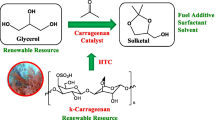Abstract
A novel method was developed for extraction of short-chain-length poly(hydroxyalkanoates) (scl-PHA) from microbial biomass by the well-known “scl-PHA anti-solvent” acetone at elevated temperature and pressure in a closed system combining components for extraction, filtration, and product work-up. Recovery of scl-PHA using this new approach was compared with established methods using chloroform at ambient pressure. The new method performs similar regarding product purity (98.4 vs. 97.7 %) and extraction yield (96.8 % by both methods), and is by far faster than established chloroform extraction (20 min vs. 12 h). Separation of the polymer from acetone is simply achieved by cooling down the acetone solution of scl-PHA, thus allows for a nearly quantitative recovery of the solvent that conveniently can be reused. Characterization of scl-PHA extracted by both methods does not reveal any significant difference in terms of molar mass and thermo analytical parameters.


Similar content being viewed by others
References
Asrar J, Paster MD, Solodar AJ, Strausser FE, Kurdikar Devdatt L (2000) Methods of PHA extraction and recovery using non-halogenated solvents. European Patent 90,975,788
Baptist JN (1962) Process for preparing poly-ß-hydroxybutyric acid. US Patent 3,036,942
Braunegg G, Sonnleitner B, Lafferty RM (1978) A rapid gas chromatographic method for the determination of poly-(β-hydroxy-butyric) acid in microbial biomass. Europ J Appl Microbiol Biotechnol 6:29–37
Chen G-Q (2010) Plastics completely synthesized by bacteria: polyhydroxyalkanoates. In: Chen G-Q, Steinbüchel A (eds) Plastics from bacteria: natural functions and applications, 1st edn. Springer, Münster, pp 17–38
Chodak I (2002) Polyhydroxyalkanoates: properties and modification for high volume applications. In: Scott G (ed) Degradable polymers: principles and applications, 2nd edn. Kluwer, London, pp 295–319
Jacquel N, Lo C-W, Wie YH, Wu HS, Wang SS (2008) Isolation and purification of bacterial poly(3-hydroxyalkanoates). Biochem Eng J 39:15–27
Koller M, Hesse PJ, Bona R, Kutschera C, Atlić A, Brauengg G (2007) Biosynthesis of high quality polyhydroxyalkanoate co-and terpolyesters for potential medical application by the archaeon Haloferax mediterranei. Macromol Symp 253:33–39
Koller M, Salerno A, Dias M, Reiterer A, Braunegg G (2010) Modern biotechnological polymer synthesis: a review. Food Technol Biotechnol 48:255–269
Koller M, Gasser I, Schmid F, Berg G (2011) Linking ecology with economy: insights into polyhydroxyalkanoate-producing microorganisms. Eng Life Sci 11:222–237
Ramsay JA, Berger E, Voyer R, Chavarie C, Ramsay BA (1994) Extraction of poly-3-hydroxybutyrate by halogenated solvents. Biotechnol Tech 8:589–594
Terada M, Marchessault RH (1999) Determination of solubility parameters for poly(3-hydroxyalkanaotes). Int J Biol Macromol 25:207–215
Zinn M, Witholt B, Egli T (2001) Occurrence, synthesis and medical application of bacterial polyhydroxyalkanoate. Adv Drug Deliv Rev 53:5–21
Acknowledgments
This study was supported by the European Commission by granting the 5th Framework Program “Dairy industry waste as source for sustainable polymeric material production” (WHEYPOL; Growth EC-Project GRD2-2000-30385), and the industrial partner BDI - BioEnergy International AG (Austria) by financing the project “Biodiesel als umweltfreundlicher Lösungsmittelersatz bei der Produktion von biologisch abbaubaren Kunststoffen”. The authors are grateful to the workshop of the Institute of Biotechnology and Biochemical Engineering at Graz University of Technology, Austria, for designing and constructing the apparatus.
Author information
Authors and Affiliations
Corresponding author
Rights and permissions
About this article
Cite this article
Koller, M., Bona, R., Chiellini, E. et al. Extraction of short-chain-length poly-[(R)-hydroxyalkanoates] (scl-PHA) by the “anti-solvent” acetone under elevated temperature and pressure. Biotechnol Lett 35, 1023–1028 (2013). https://doi.org/10.1007/s10529-013-1185-7
Received:
Accepted:
Published:
Issue Date:
DOI: https://doi.org/10.1007/s10529-013-1185-7




